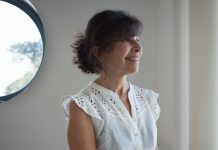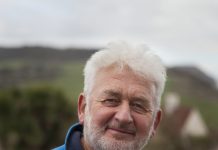‘I came to work in Dorset in April 1974, on a community development project funded by the Department of the Environment. I was working in London and quite keen to get out; I had failed three interviews already for related projects, so perhaps the practice helped and they offered me a contract. The scheme was called ‘Community Initiatives in the Countryside’, and really set the tone for all my time in Dorset.
For the first couple of months I lived in a caravan in a slightly out of season campsite at Owermoigne which I shared with a tethered goat and a few glow worms. I had little knowledge of the countryside then, but from the campsite one could easily walk out to the coast, which I loved. Maybe one reason I came to Dorset was memories of childhood holidays. My father was an electrical engineer; we lived at Farnborough, where he worked, practically under the flightpath, but his passion was mountaineering and sea swimming, so holidays in wild places like Snowdonia provided a complete contrast to life in the Home Counties. Also I was lucky then to go to the University of Kent where I met up with a good friend, Howard Williams, some of whose family lived in Torridon on the West Coast of Scotland. Spending time there and soaking up the culture of that area gave me a taste for life in the countryside and being part of a small community.
At university in Canterbury, with people from all walks of life, there was a sense of optimism. It was a modernist campus, set on a hilltop above the city, and some mornings especially I felt quite blessed to be there. I was strongly influenced musically there, for example discovering Miles Davis’ work. I remember listening to the whole of In a Silent Way in a record shop booth in one take! This was ‘69 to ’72, very full-on years in musical terms; Kevin Ayers and the band Soft Machine lived locally, and the city seemed quite a cultural honeypot. I remember seeing a production of Waiting for Godot and, to my great shame, leaving at the interval thinking it had finished! I also saw a show called Corunna, which combined actors from the Royal Court, like Brian Glover and Jack Shepherd, with live music from Steeleye Span. This was a very powerful mix of folk song and narrative, an innovative attempt to make high quality, distinctive popular work. Looking back now, after many years’ working in arts promotion, I realise how influential, in different ways, that period was.
My early days in Dorset were with the Rural Community Council, which introduced me to many aspects of rural life. I was working with Village Halls, Parish Councils, playgroups—communities wanting to get projects off the ground. There was also a rural film circuit, which we called ‘Reels on Wheels’. Film rather than discs in those days of course, which gave plenty of scope for disaster. I remember a spool coming off during a Robert Redford film. The film melted in the projector giving the audience an unplanned but memorable psychedelic experience! What stuck with me was how crucial to small communities the village hall was, and still is. This is not an accident; it’s to do with their charitable structure, whereby local people can work together, contribute and get things done, combined with targeted help from charitable foundations, supportive councils and of course masses of voluntary input.
After 9 years of working happily in Dorset I was lucky enough to be offered a travelling fellowship by the Arkleton Trust, a sabbatical during the winter of 1983/84 to the West of Ireland. It was a fantastic opportunity, a broad brief, looking at forms of community development practice in the Irish speaking areas, the Gaeltacht. I was based in Connemara, but travelled up and down the West Coast, looking at how people were tackling quite fundamental issues of infrastructure provision and social and economic deprivation. This was before the Eighties boom, and there was talk again of emigration. But the interesting thing was that teachers, and to some extent priests, were staying put in communities, becoming leaders, trying different ways of working, for example forming all-embracing ‘community co-ops’, confronting economic, social and cultural challenges. In this way they were building community self-confidence, often subverting normal political channels, and negotiating directly with EU funding sources. This seems to me to be what successful community development is all about, the encouragement of communities to speak up for themselves as people with first-hand knowledge of what needs to done locally. There were remarkable things happening at the time, such as a project in West Kerry enabling agriculture on impossibly unproductive bog land, and using early computing technology, seemingly moving from a pre-industrial to post-industrial world in one jump. Local cultural imperatives were also clear, for example via their commitment to popular Irish language courses. The chairman of that project said: “It all comes back to man’s creativity. Once he starts, well, it’s very hard to say where he’ll end up. The hardest thing is to start”. The experience was confirmation for me that culture is far more important than is presented professionally; it’s an expression of life.
Coming back to England was a culture shock; struggling to adjust I found myself best man at my friends Laurie and Deidre Baines’ wedding and thankfully there I met Katharine, who would become the light of my life, and her two children Aaron and Jessica. My spell in Ireland led to a period of unemployment back in England, so I had time to write up my experiences properly. During that period, in the mid ‘80s, I was asked to help find locations for the film ‘Comrades’, the story of the Tolpuddle Martyrs. I remember reading Bill Douglas’ brilliant script early on—the funding took at least 3 years to get sorted—which absolutely captured the power of what the film could be, making it very easy to find possible locations. Involvement with that film helped me see the way creative artists need to work in an environment where they’re not constantly worried about logistics and so forth, so that they can concentrate on what they’re good at.
I also did some work for the Gulbenkian Foundation, meeting Dorchester Arts Centre members who I remember had an interest in outreach. In January of 1990 I took over the co-ordination for them of what had become Artsreach from Debbie Rigg who had brilliantly designed the scheme essentially as it is today, booking artists and events in village halls, particularly then in West Dorset.
Throughout my time at Artsreach I have been priviliged to work with remarkable people, colleagues, volunteer promoters in village communities and of course some extraordinary artists and performers. The Arts Council nationally began to see ‘rural touring’ as a very efficient way of delivering high quality arts to rural communities, combining eventually with all Dorset’s rural district councils and Dorset County Council to form a sustainable basis for Artsreach’s funding. The key point, looking back, was that right from the start audiences were good, the resulting earned box office income becoming money to re-invest in artists and performers. Recently, at the grand old age of 66 I felt the time was right to stop, and I’m very happy that the organisation is carrying on in such great shape.
At the core of a great performance in a village hall is the transformation of the familiar space. I think that’s what great art does; it transforms the moment you’re experiencing so that you find yourself ‘somewhere else’. Afterwards of course the hall returns to its former glory! An added bonus is that village halls benefit financially, and local people have a chance to see great performances they might not otherwise have gone to. For artists, it’s a special thing to work so closely with their audiences.’









